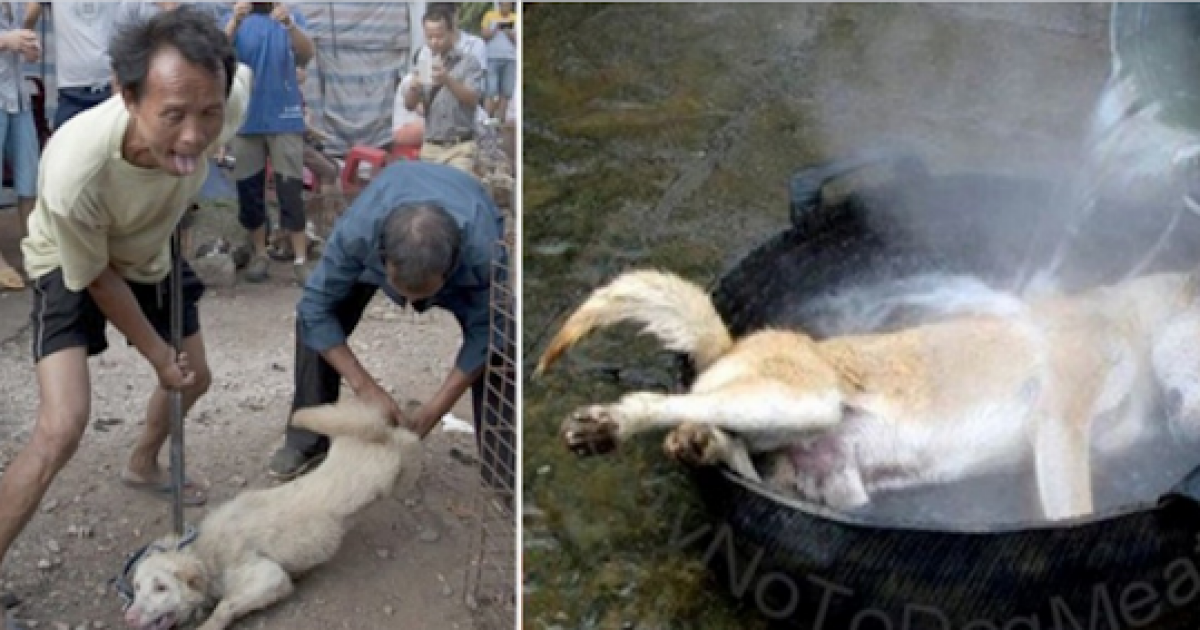Prohibit the Chinese festival of eating dogs, killing, exploitation and consumption. Change the legislation
1,398 people signed. Let's get to 50,000!

Addressed to: Government of China and 3 more
The festival that kills about 20 million dogs begins in 5 weeks. The first preparations are underway in the city of Yulin, in Guangxi, Zhuang Autonomous Region, in the south of China, for another edition of the Linchee and Dog Meat Festival, which will begin on June 21, an annual tradition to commemorate the Summer solstice, an important date in the Chinese calendar. This event, therefore, is scheduled to begin in approximately five weeks from now!
Each year, more than 10,000 dogs are brought from across the country to Yulin specifically for this event, most of them stray animals or stolen pets.
Last year despite the victory of environmentalists to achieve the ban on the sale of dog meat during the festival that takes place every June 21 in Yulin (China), despite the loud protests that take place every year after the aberrant celebration, this year has come back to celebrate. Yulin celebrates his controversial, controversial and for many aberrant dog meat festival.
In a statement, the Humane Society International (HSI), one of the leading groups in the fight against trade in dog meat in China, said on the previous occasion that several activists recorded how the Yulin Police force some vendors to close their sales positions.
The inspections carried out between strong surveillance measures – after the famous disturbances of the last edition – were due to the fact that on June 15 came into force a law that prohibits the sale of dog meat in restaurants, markets and other businesses from China.
The measure, which was announced by animal groups in the middle of May, was implemented six days before the beginning of the previous annual festival of dog meat in the Asian country.
"It is encouraging to see how the Yulin authorities are applying their commitment to prohibition (...) shows that, although the measure is not perfect, it is having a real impact," said Peter Li, political analyst at HSI in China.
Of course we all want to see a total and immediate end of the sale of dog meat in Yulin (...) but we have always known that its end is not going to be as simple as turning off a light ".
However, as confirmed by the HSI itself, before the anger of the merchants -mainly installed in the Nanqiao market- by the entry into force of the new regulations, the authorities reached an agreement with them "at the last moment" that allows them to sell a maximum of two dogs per position.
According to the organization, several Chinese activists who stood guard on the 15th in the popular market of Dongkou, said that the volumes of meat on sale were "much smaller" than in previous years, when it was estimated that around 3,000 dogs were slaughtered.
In 2016, the HSI estimated 2,000 and 4,000 dogs that are slaughtered in these two days. Traditionally they are beaten with metal bars until death, although there are also others that kill them beforehand.
The activists not only denounce the practice of eating meat from the "best friend of man", but also the mistreatment to which they are subjected in this celebration and the fact that the festival helps to promote an illegal market that operates throughout the country.
For its part, the promotion department of Yulin said last week in statements to the Beijing News that the festival "is not an official festival" and that the municipal government "has not taken any policy to prohibit the sale of dog meat".
"Of course we all want to see a total and immediate end of the sale of dog meat in Yulin (...) but we have always known that its end is not going to be as simple as turning off a light," Li said.
The Yulin festival, held every year to celebrate the summer solstice, is not – contrary to popular belief – a tradition rooted in Chinese society, but was created in 2010 by the dog meat sellers themselves to increase its sales, which by then had declined significantly.
According to HSI data, between 10 and 20 million dogs are slaughtered in China every year for food consumption, a practice that is not illegal at the moment in the country but animal advocacy groups have been trying to eradicate for years.
SIGN AND SHARE THIS PETITION
The content of the petitions and the opinions expressed here are the sole responsibility of the author.
